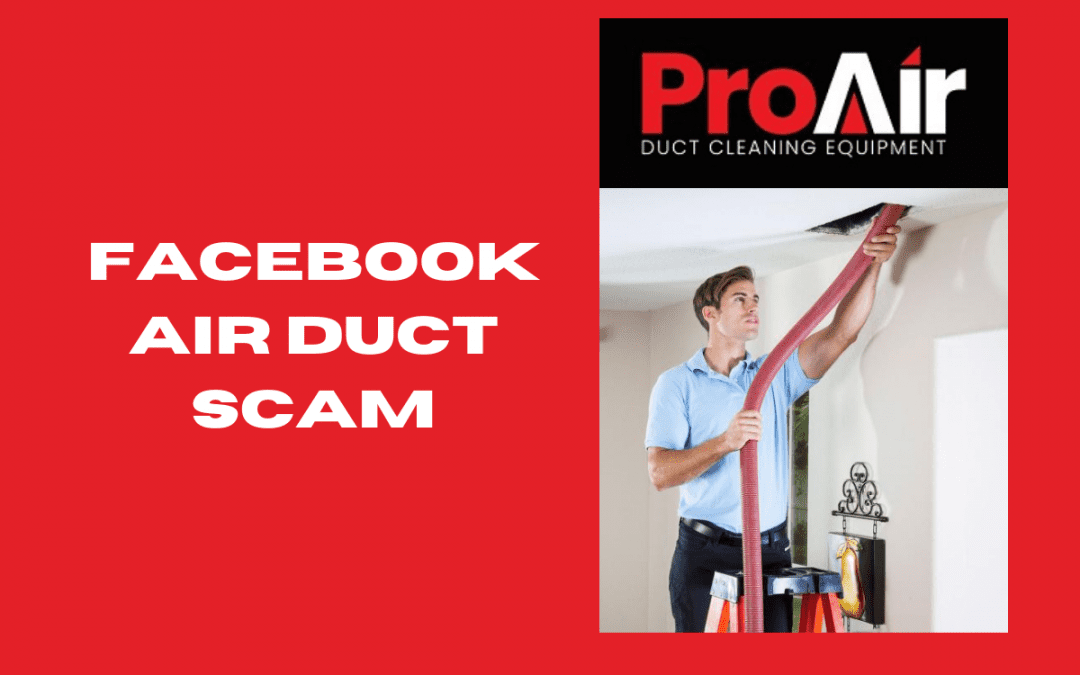Facebook Group scams are another typical scam you’ll find on social media platforms. For duct cleaning, you may want to check out your town’s, county’s, or region’s Group Page. One of the most popular frauds on Facebook recently has been duct cleaning. You’ve undoubtedly seen one of these postings if you’re on Facebook at all. While displaying photographs of a guy clutching clumps of dust and lint, someone tells you to “Believe my work, not my words,” with the accompanying images. If you’re like most people, you’re curious about whether or not this is real. As air duct cleaning equipment becomes more popular on social media, we’re going to take a look at how you can protect yourself from duct cleaning predators.
What are the Scam’s blatant warning signs?
To avoid being a victim of one of these people on the internet, it is essential that you understand how to recognize scams. It’s not a real offer or service if there are these red flags.
Any of the Following Phrases Appears in Their Post
When it comes to scams, many of these postings utilize the same words in their adverts. You should be suspicious if you see this combination of terms used.
- Cleaning the ducts is an absolute need. What’s going on with your lungs?
- Special discounts are available to the first XXX commenters.
- In the comments, they beg you to DM them, but they never provide any details.
- With our whole-house Duct Cleaning and Free Camera Inspection, we are offering a fixed fee.
- All of my work is guaranteed!
- This isn’t a ruse, I assure you.
- They often use the phrase “Kindly.”
- Their Facebook Account or Group Membership Has Just Been Activated.
The contact information of a respectable business will be easily available. Since legitimate companies aim to make it as simple as possible for you to get in touch with them, the absence of contact information (phone number, email address, website) should serve as a warning sign. Real duct cleaning companies won’t shy away from inquiries concerning their company practices or their NADCA certification.
The possibility that a post is a fraud rises if a Facebook account seems to be new, has few posts/pictures, and just joined the platform or group they are posting in. When these accounts are disabled for using someone else’s identity or making these scam/spam postings, new profiles must be established or obtained in order to continue posting.
Because their Facebook Username Doesn’t Sync with their Profile Name
If you go to a person’s Facebook profile, you’ll frequently find that the account’s username doesn’t correspond to their real name. In this case, the user’s name is “XYZ,” yet their profile says their name is “ABC.”
Because They Don’t Include Their Company Name in the Post
One of the most important things that local businesses will include in their advertisements is the name of the company, their website, and an option to contact them. Scams are more likely if the person you’re speaking with doesn’t give you the company name right away or if you have to press them for it.
No Active Company or Organization Is Linked to Their Phone Number. You Cannot Locate the Company Name on Google
If you’re given a phone number to text, be sure to do a quick Google search on it before texting the person. You should be wary if the search does not lead you to a legitimate duct cleaning service. Scams are more likely to succeed if the phone number is not a local one. “24/7 Ducts Care” or “USA Duct Cleaning” or “HVAC Duct Cleaners” are the most common corporate names. Forget about using the name they provide you since it’s very difficult to obtain any information on the firm they claim to represent.
Duct cleaning scams that claim to lower the risk of developing an illness can’t provide you with any kind of license number or identification. Last year, COVID-19 sparked concerns from a number of groups.
In order to lawfully provide duct cleaning services, a license, insurance, and a bond are all a must. If the person does not have a business license, at the very least, you should not conduct business with him or her. If a firm can’t be trusted to perform what it says it will, then homeowners may turn to license and insurance as a safety net and an avenue for redress. With no business license or insurance, if you are cheated by an individual, you have very little recourse.
“Duct Cleaning” scams are becoming more common, so how can I avoid becoming a victim?
The most important thing you can do to protect yourself against internet fraudsters is to be aware of the warning flags. The second step is to look at local businesses with a good reputation and a track record of exceptional service. Customers may leave evaluations, contact information is readily available, and the company is involved in the community.
Don’t spend your time contacting the poster if you spot a duct cleaning scam. To avoid the risk of other fraudsters getting hold of your personal information, do not provide them with any personal data. And don’t let someone you don’t know to enter your house. The best you can do is inform the group administrators that the post seems to be a fraud. Administrators of such Facebook groups should delete the offending post immediately to ensure the safety of its members. It’s up to you to find the scammer’s account and report it, too! It’s also possible to file complaints on Facebook. However, they don’t respond very quickly. Moderators are unable to take action since the crime is taking place outside of Facebook. Despite our best efforts, we’ve been unable to stop several duct cleaning frauds. It’s up to us to be vigilant and keep an eye out for one another.
